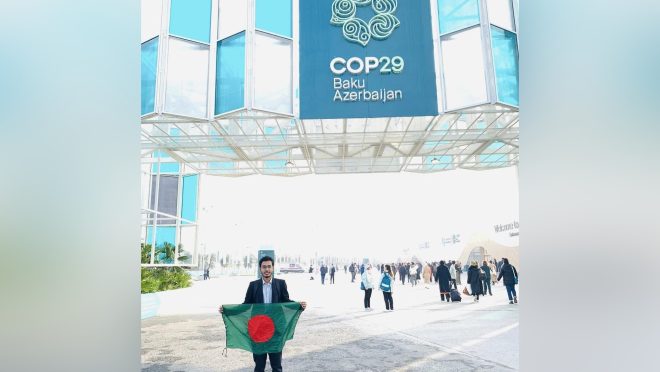Dreaming green: A bangladeshi climate advocate’s journey to COP 29
Dreaming green: A bangladeshi climate advocate’s journey to COP 29

From the outset of my work on the environment and climate, I wanted to share with the world the struggle for life in my country. The annual United Nations conference, COP (Conference of the Parties), is a certain summit where representatives of all countries come together to devise strategies that offer a solution to the problem of the climate crisis.
This year, COP 29 was held in Baku, Azerbaijan, with the theme “In Solidarity for a Green World”. This COP was very special to me because I founded my organization, Green Lead, with the mission of leading for a green world. This theme isn’t just a set of words for me; it reflects my personal belief in creating a new thought leadership, i.e., green leadership.
The conference started on November 11, and I began my journey from Chattogram on November 9, via the UAE en route to Baku. Azerbaijan, with the Caspian Sea in the east and the Caucasus Mountains in the north, borders both Asia and Europe. Though I had traveled abroad before, this was my first COP and my first visit to Baku. Naturally, I felt a mix of excitement and uncertainty. Yet the warm reception by the volunteers at Heydar Aliyev International Airport in Azerbaijan gave me a great start to my morning on November 10.
Upon arrival in Baku, I went to the venue and completed the registration process. Just before entering, I took a photo holding the flag of Bangladesh, reminiscent of my deep love for my homeland.
The Conference of Parties is a set of summits where governments and other stakeholders assess the progress of global climate agreements and work toward the aim of keeping global warming within 1.5°C. Composed of 198 parties, which include 197 countries and the European Union, COP symbolizes universal participation in climate action.
The first COP took place in 1995 in Berlin, Germany, and this year’s 29th session took place at the Baku Olympic Stadium. With a central focus on climate finance, this year’s conference was built on two pillars: one, to “enhance ambition” by encouraging countries to adopt bold and transparent national plans, and secondly, “enable action” by focusing on commitments with financing, emissions reduction, adaptation to climate change, and addressing loss and damage.
It kicked off at the Nizami Hall, where representatives all over the world attended, such as His Excellency Dr. Sultan Ahmed Al Jaber (COP 28 President), His Excellency Mr. Mukhtar Babayev, President-Designate of COP 29, and Mr. Simon Stiell, UNFCCC Executive Secretary.
First of all, being the first timer, I had been trying to gain the comprehensive processes and stakeholders. Attended the session on GST about country progression towards the achievement of the goals under the Paris Agreement, joined one session of the meeting on mitigation where the main statements from Bangladesh have been heard.
On November 13, I attended a panel discussion titled “Capacity2Action: Youth Climate Talks” at the Saleemul Huq Action Research Exchange Hub, SHARE Hub. I shared insights with participants from Nepal and China on the activities of Green Lead in Bangladesh. I called for the urgent need for everyone’s action in their own capacity, be it through climate careers or entrepreneurship, in building a climate-resilient green world.
Later, I was able to participate in the “Youth Gathering – To Build a New Civilization” program organized by the Government of Bangladesh at COP 29. Dr. Muhammad Yunus, Chief Advisor, interacted with us in the program. He told us, “You must dream. Dreams are the most powerful driving force in life. If you dream, there is a chance of making a big change in life. But if you don’t dream, I can promise you it’ll never happen.” His words made us dream big and work to realize them.
The summit was tagged “finance COP’ where developing nations pressed for a New Collective Quantified Goal – NCQG, but it ended with a pledge from developed nations to contribute at least $300 billion annually to support adaptation. I had hoped for a more ambitious outcome – on both finance and mitigation – to meet the great challenge we face.” He went on further by adding, “But this agreement provides a base on which to build. It must be honored in full and on time. Commitments must quickly become cash.”. All countries must come forward to see that the top end of this new target is met”
COP 29 has ended with a compromise. But I believe optimism remains our only viable path forward. Whatever the decisions, countries like Bangladesh will continue to suffer from climate disasters. So, we must go forward undeterred and make full use of every available means.
While we need to raise our voices to have an impact on future negotiations, we cannot afford to wait, since disasters will not wait for decisions. We must strengthen our capacity to build resilience with whatever resources are available to us.
In all my interactions with various stakeholders around the world, I realized the gravity of the issue of solidarity in dealing with the climate crisis. Most inspiring was the determination of young people across the globe to dream of and act toward a better future.
We are at a critical juncture in human history. At this point, our collective solidarity and ability to act will shape the future. Let’s adopt an all-hands-on-deck approach to limiting emissions and securing an unlimited future for generations to come.


